
by Gideon Marcus
[Time is running out to get your Worldcon membership! Register here to be able to vote for the Hugos next year.]
Ubermensch
There's no question that John W. Campbell's got an axe to grind. Not too long ago, he wrote an editorial about how the bipedal humanoid form, the best, most efficient, most effective of body types, was the natural end result of evolution on an Earthlike planet. In another screed, he opined that slavery warn't so bad, and that Black Americans did better ante-bellum than we think.
These aren't anomalies: from what Isaac Asimov and others have said (I've never met John personally), the editor of Analog has some very fixed views of the world, and they include a belief in a hierarchy of races, a natural superiority of some to others.
Because of this, the stories in his magazine tend to reflect this view, one way or another. Either John adds these elements in post-production, or his authors know to include them as a way to guarantee a sale. Analog is a prestige publication, after all.
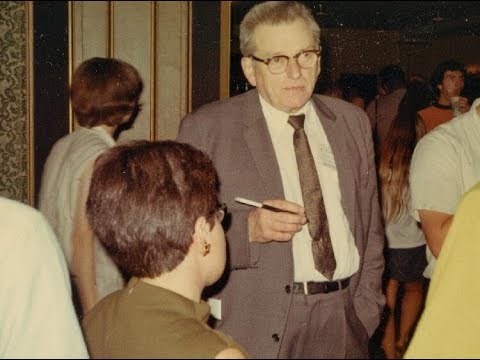
And lest you think that's John's quaint views are simply emblematic of the less-than-enlightened times we live in, I will simply point out that we review all science fiction mags at the Journey, and Analog definitely is the odd man out.
Anyway, this month's magazine is a particularly egregious example of the Campbellian Mystique. Let's dig in, shall we?
Sein Kampf
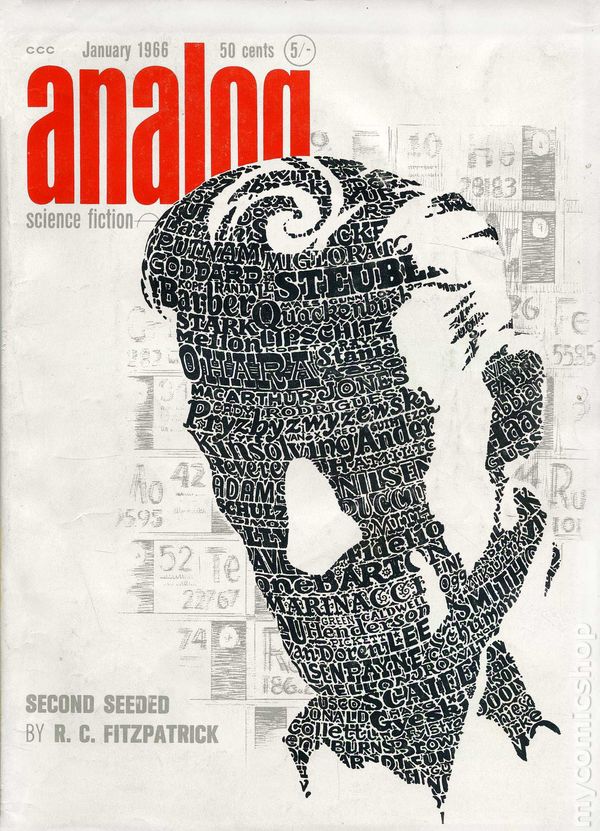
by Kelly Freas
Second Seeded, by R. C. FitzPatrick
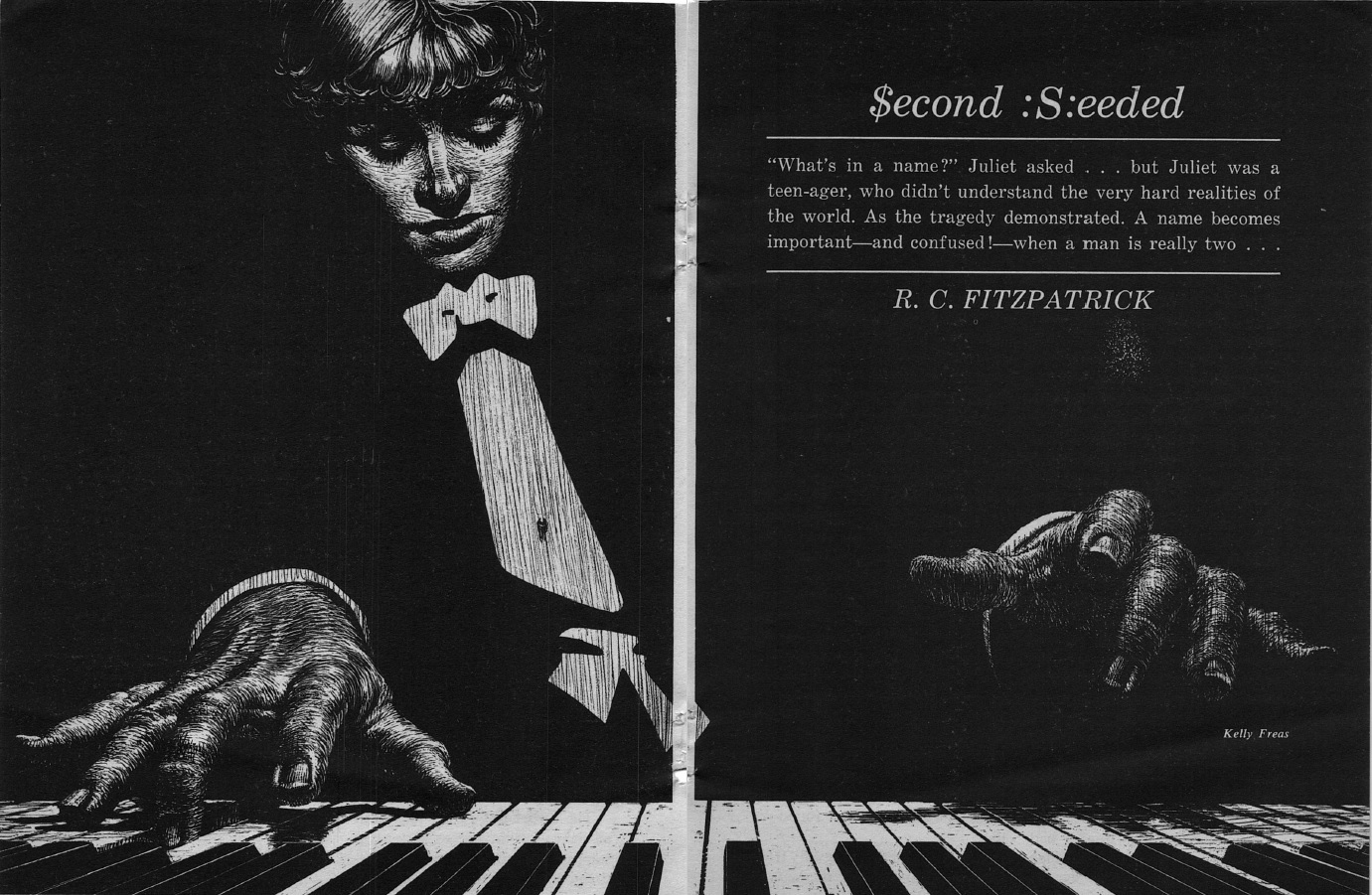
by Kelly Freas
In FitzPatrick's earlier story Half a Loaf, we were introduced to a revolutionary institute whose surgeons could transplant a healthy mind from a ruined body into the healthy body of a mental vegetable. The story explored some of the ethical concerns involved and, while it didn't hit it out of the park, it was pretty interesting.
The sequel is dreadful.
A Marine Major, name of Adams, is killed along with his wife in action in Borneo. Their infant son becomes brain dead from hypoxia, all hope of regaining cognitive functions lost. Around the same time, the infant son of two concert pianists is in a car accident that kills his parents and leaves him a quadriplegic. Thus, the stage is set for a human brain transplant; the new wrinkle is that the patient won't have memory of the event, will be raised by the extended Adams clan.
This would be fine, even interesting save for the endless screeds in favor of eugenics that come out of the mouths of the protagonist. The basic argument is that there aren't enough "Great Men" in the world as it is (women, explicitly, don't count) so saving as many as possible through this surgical technique is of utmost importance. Beyond that, it's vital that the transplanted infant brain be an Adams because the Adams family is amazing and has been so since the time of the Revolution. As an "Adams," the pianist boy will not only be an exemplary person because his parents were prodigies, but his gonads will house Adams sperm, which will ensure the Adams genes continue. The espouser of this view gets a bit vague and contradictory when asked if it's the actual genetics or simply the continuity of family that ensures the Adamses produce a Great Man every generation, but it's clear he tends toward the former (and this is borne out by events in the story).
Two stars rather than one, because it's not badly written. But yech.
Now, since I had to pay to read FitzPatrick and Campbell's offensive rant, you can get mine for free. In my experience, all human beings are of roughly equal potential. Sure, there are smart ones and stupid ones — abilities distribute in bell curves — but whether a person will be smart or stupid does not correlate to genetics. This means that everyone, given resources and opportunity, can develop to the fullest of their physical capabilities. They can be as smart, strong, and talented as is possible for them.
There are almost three billion people on this planet. Some of them are stupid. Most of them are average. Some of them are brilliant. If we want more "Great Men", there are much better ways of growing them than cherry picking a few children with presidential surnames.
One is to raise the standard of living for everyone so that all children have the ability to develop to their full potential. LBJ has the right idea with his Great Society; I expect the next generation will see a lot more geniuses (and happiness) in Appalachia.
Another is to broaden the pool from which "Great Men" are drawn. Here's a crazy thought: what if women weren't excluded from the pool? Wouldn't that, in and of itself, double the number of Great "Men"? And indeed, that's just what's started to happen already. I have written about the women scientists and engineers involved in space exploration. Their work has been critical to the success of our space-related endeavors, and there is no guarantee that their contributions would have (or could have) been made by anyone else, at least at that juncture in history.
So I disagree with the the theme of Second Seeded. Like all bad philosophies, it collapses in the face of empirical evidence to the contrary. And on a related note, I disagree that future Presidents of the United States will all have to have socially acceptable WASP names like Adams, Lincoln, and Jackson (as one of the characters opines in the story). Does anyone remember the fellow with the funny name of "Eisenhower"? Or the Irish Catholic name of "Kennedy"?
I fully believe that we'll have a President in my lifetime with the "exotic" name of Takahashi, Singh, or Okoye. Perhaps her first name will be Mildred.
Untropy, by Christopher Anvil
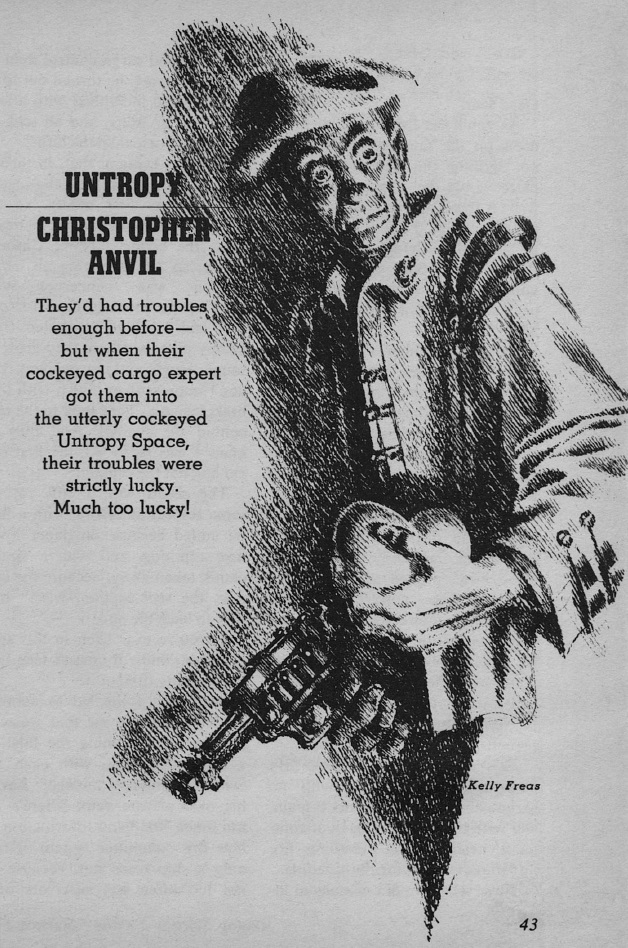
by Kelly Freas
Shaggy dog tale about a trading vessel that gets lost in hyperspace in a zone where the laws of probability leave nothing to chance. The way they get back is obvious, and the story is rather trivial, but it's not bad reading.
Three stars.
A Bit Player, by Lyle R. Hamilton

All about the evolution of telemetry and its application to missiles and space travel. Long, engaging, but way too high level for me (and I majored in astrophysics!) it will probably go over your head as well.
Three stars.
Kelvin Throop Rudes Again!, by E. Silverman
My outspoken nephew, David, has a habit of dashing out discourteous memos when he's peeved. He calls them "nastygrams". In Throop, new author Silverman offers up a collection of memos (it's not really an epistolary story as there's no story) of a middle manager kvetching at subordinates and vendors.
Not science fiction. Not good. One star.
Beehive (Part 2 of 2), by Mack Reynolds
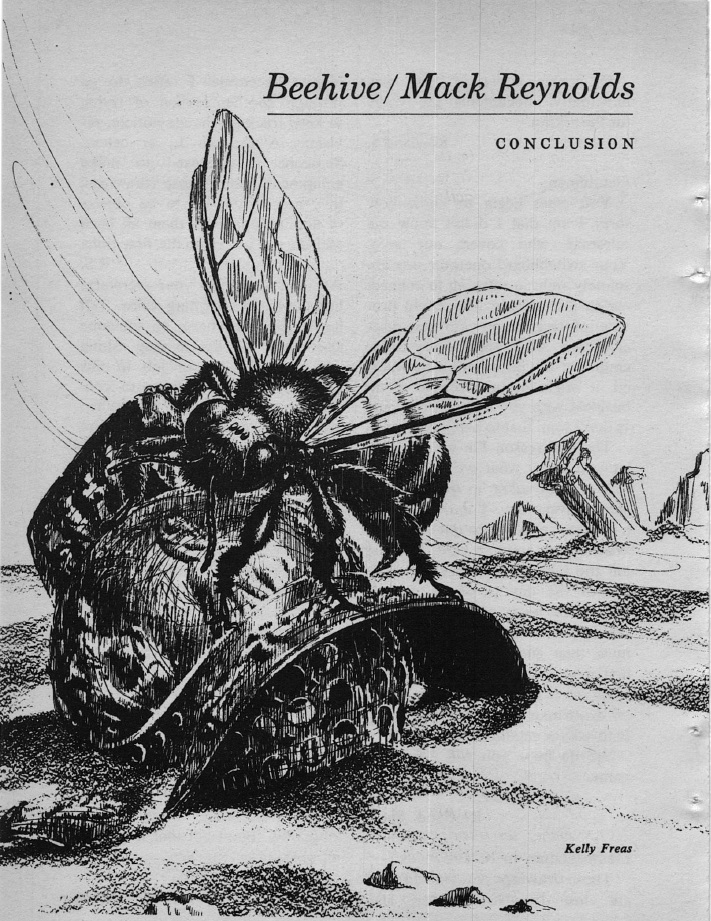
by Kelly Freas
And, at last, the conclusion of Beehive, which began last issue. Genetics takes the fore again when we learn that the enemy "Dawnworlders" have divided themselves into rigid castes, and in so doing, have thus been able to progress to tremendous technological heights. Of course, if non-caste human beings had been given millions of years to accomplish the same feats, I'm sure we could have…
Anyway, the second half of the story is just as glib and silly as the first, with lots of speeches and exposition. I did appreciate that there was some self awareness that Section G of the United Planets is as much a dictatorship as Phrygia, home of Baron Max, the would-be galactic Mussolini. This was alloyed by the constant reinforcement that the protagonist's sidekick is an Indian. He's referred to as "the Indian" and he uses the words "squaw," "scalp," and "firewater," whenever he can.
This isn't the first time Mack Reynolds has had trouble with this particular ethnicity.
Anyway, there are some interesting Laumeresque bits, but for the most part, this is a Reynolds that can be skipped.
Two stars.
Calculating the damage
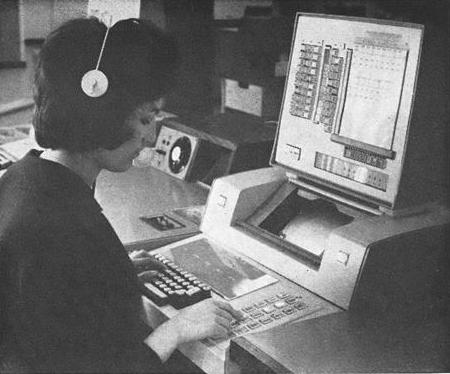
Feeding the pages of the January 1966 Analog into the Star-o-meter (and setting the machine to "destroy copy after processing") I get a result of 2.3 stars. Depressingly, I'm sure this will be one of the more popular issues of the magazine this year.
How did the other mags fare this month? Well, Worlds of Tomorrow and New Worlds both scored 3.3 stars. The less daring Science Fantasy got 2.8 as did IF, even though the latter was buouyed by the new Heinlein serial. Fantasy & Science Fiction turned in a disappointing 2.5 star performance, and the mostly reprints Fantastic barely got 2.4.
They were still all better than Analog.
Speaking of shallow selection pools, women continue to be barely represented, producing two of 36 fiction pieces for a whopping 5.5% share. Better than the 0% of last month, I suppose. All told, the truly good stories this month would struggle to fill the pages of IF, much less a bigger mag like Galaxy.
Well, tomorrow is a new year. Perhaps Janus will favor us with auspicious auguries, and our fortunes will turn around. And hey…Campbell won't live forever.

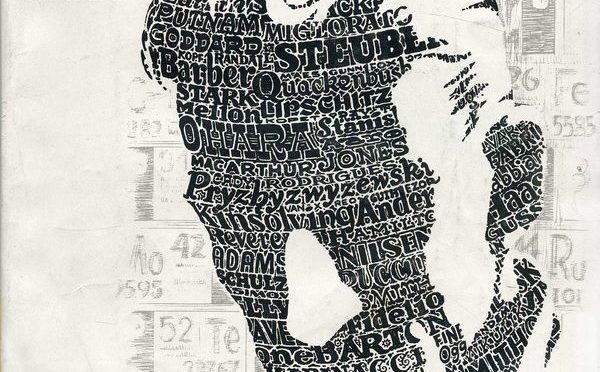

Honestly, this issue is so bad, the stories aren't even worth discussing. When the best story in the issue is a mediocre shaggy dog tale, you have to wonder why they bothered at all. The cover's pretty bad, too. All in all, it's a heck of a way to start the new year. Let's hope these are the floor sweepings from the last 12 months.
Campbell delenda est.
I'll have to admit that the cover art, which I found unusual and striking, was the thing I liked best about this issue. (Did you notice that Freas snuck the name "Quackenbush" among all the others? I assume that's an allusion to the character of "Dr. Hackenbush" as played by Groucho Marx in "A Day at the Races", who was originally supposed to be called "Dr. Quackenbush" but it turned out there really were physicians with that name.) The interior illustration to the lead story was very good, too.
Not so the fiction. Disregarding the distasteful contents of "Second Seeded", it just fails as a story. There's no real plot, just people talking and talking and talking about the one thing that happens.
"Untropy" was a lousy attempt at comedy. All the antics going on weren't funny, and the idea of a place in space where probability doesn't work is just stupid. I think Iiked it less than you did. Anvil has done much better at this sort of light amusement, even if he's done it too often.
"Kelvin Throop Rudes Again!" was a pointless exercise in griping about incompetence.
Nowhere for the magazine to go than up from here!
You are probably right that I was too generous with my ratings. As it is, Analog still ended up at the bottom of the pack.
And I agree — the cover is striking in its own way. It feels modern. Too bad the contents of the mag are anything but…
That Freas interior illo that uses black ink scratchboard (primarily a Schoenherr technique hitherto) to illustrate the young pianist in 'Second Seeded' is a beautiful piece of work. And count me among those who like the Freas cover for doing something new graphic design was.
The fiction in Campbell's magazine may be junk, but he's still got the best-looking SF magazine out there.
Freas really turned in some beautiful work for this one. I'm glad he's back in the field.
Did you notice he's the only illustrator for this mag this month?
And Happy New year!
sorry, typo: 'graphic design-wise.'
Happy New year
Freas just returned from living in Mexico for cheap for a couple of years and devoting himself to fine-arts endeavors down there.
Which explains both his willingness now to grab as much paying work from Campbell as he can and the uptick in the quality of what he's turning in. Recent cover illos like 'Space Pioneer' and 'Beehive' have composition-wise been in line with what he's done for Campbell since the mid-1950s — unlike this current cover — but his rendering of light, shadows and surfaces is a whole lot finer.